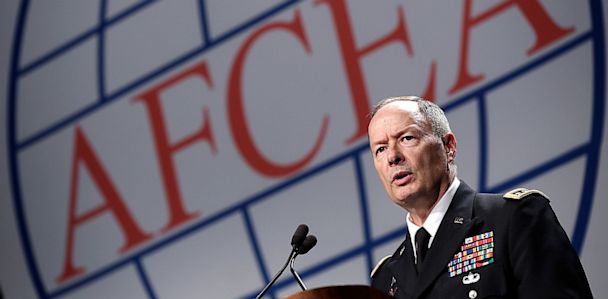NSA Chief on Email Collection: NSA Deleted Data, Wanted to Protect Privacy

Win McNamee/Getty Images
NSA Director Gen. Keith Alexander addressed the new Guardian reports of mass U.S. email collection on Thursday, saying the NSA terminated the program because it was ineffective and wasn't worth the risk to citizens' privacy.
The Guardian, to which Edward Snowden leaked details of a broad U.S. program to collect phone records of citizens, reported on Thursday that Guardian-obtained NSA documents show a similar program to collect email records. The program, which reportedly began in 2001 under President Bush, continued until 2011 under President Obama and involved mass collection of email "metadata"-records, but not the contents of emails-between U.S. citizens and email accounts outside the country.
"We started that debate and said this did not have the value to stop the terrorist attacks that we need," Alexander said during a speech in Baltimore. "We went forward to the administration and Congress and, with all their support, shut that program down, because it wasn't meeting what we needed and we thought we could better protect civil liberties and privacy by doing away with it."
Alexander said NSA did not keep the data it had collected under the program.
"All that data was purged at that time," Alexander said.
Alexander spoke at the Armed Forces Communications and Electronics Association's International Cyber Symposium-sponsored in part by Booz Allen Hamilton and Verizon-at the Baltimore Convention Center, before about 600 cyber-industry and military attendees.
Snowden, the now-infamous leaker who has thus far evaded U.S. authorities, worked as an NSA contractor for the consulting company Booz Allen Hamilton when he leaked NSA documents to The Guardian and fled the U.S. The first Guardian story that brought wide attention to Snowden-leaked programs detailed NSA collection of phone records for Verizon customers.
Alexander said he's worried about more leaks. During his speech, Alexander sought to defend NSA's surveillance programs and hit back at "inflammatory" and "sensational" news and commentary about the leaked programs.
"The damage is real," Alexander said, citing "a long-term detrimental impact on the intelligence community's ability to detect future attacks. These leaks have inflamed and sensationalized for ignoble purposes the work that intelligence community does lawfully under strict oversight and compliance. If you want to know who's acting nobly, look at the folks at NSA, FBI, CIA, and the Defense Department that defend our nation every day and do it legally and protect our civil liberties and privacy."
Edward Snowden should have used officially designated channels to raise his concerns, Alexander said, noting that the National Security Agency, Department of Defense, and the Director of National Intelligence's office all have whistleblower offices and inspectors general for that purpose. And he defended the intelligence community's practices in general.
"I think our nation is among the best at protecting our privacy and civil liberties," Alexander said.
The NSA director also said President Obama was briefed on domestic surveillance programs upon taking office and pressed NSA on whether they were necessary.
"When President Obama came into office, I met with him in the first few weeks on these programs, and he wanted to make sure that they were essential for defending the nation, and that we could, with these, still protect our civil liberties and privacy, and he pushed us in that," Alexander said. The NSA designed its policies after conversations with the administration and Congress, Alexander said.
Alexander also said he's been urged toward transparency "from the president on down."
The NSA director repeatedly defended NSA employees as "noble" and said, of the recent leak fallout and criticism of NSA, "They take it hard."
Asked about what NSA can do to prevent leaks from contractors, Alexander acknowledged that NSA must rely on them to do its job.
"We need to partner with industry," Alexander said. Members of the cybersecurity industry had sponsored the event and presumably were in attendance. "It is not something that we can just walk away or say that we'll do ourselves."